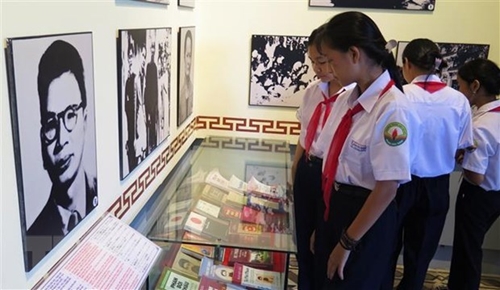The exhibitions are part of the activities to celebrate the 50th anniversary of diplomatic relations between Vietnam and Japan (1973-2023) and the 118th anniversary of Dong Du movement, which was initiated by Phan Boi Chau in early 20th century to encourage young Vietnamese to go East to study and seek ways to salvage the nation.
    |
 |
|
Visitors at the exhibition |
Meanwhile, Asaba Sakitaro, born in 1910 in Higashi Asaba village, Fukuroi, was a famous doctor who established Odawara Hospital, where he met Chau. The doctor gave Chau great support when he was in Japan.
Director of the department Phan Thanh Hai highlighted the life and career of Chau, describing him as a cultural ambassador connecting Vietnam and Japan and one of the first contributors to the friendship and diplomatic relations between the two countries.
Hundreds of images, documents and items at the exhibition give visitors a deeper insight of the Vietnamese revolutionary as well as his friendship with Asaba Sakitaro, Dong Du movement and the Vietnam-Japan partnership.
They aimed to educate patriotism and national pride among the youth, while contributing to fostering the friendship and cooperation between Vietnam and Japan.
Phan Boi Chau, born in 1867, was a pioneer of Vietnamese 20th century nationalism. In response to the Dong Du movement, hundreds of Vietnamese students went to study in Japan in a hope that they could help reform the country in return. When the movement faced difficulties in 1908, Chau received whole-hearted support from the doctor and other people in Fukuroi.
After leaving Japan, Chau continued his activities in several countries. In 1918, he returned to Japan and learnt that his friend passed away nine years earlier. Chau and people in Fukuroi raised funds for a memorial stele of the late doctor near his tomb, which is now a cultural heritage of the city.
Although the Dong Du movement failed and those students had to go home, what Asaba Sakitaro and Fukuroi residents had done for Chau and his followers remains forever in the Vietnamese people’s hearts.
The Phan Boi Chau monument area in Hue city where Phan Boi Chau spent his last years is keeping a large number of documents and items related to the nationalist figure. In 2010, people of Fukuroi and Hue came to the place and build a stele marking Vietnam-Japan relations and the Dong Du movement.
Source: VNA